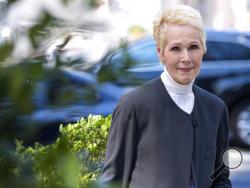Nearly a week after the latest sexual misconduct accusation against President Donald Trump, the story has largely landed with a thud.
Some see the muted response to author E. Jean Carroll's allegation of Trump assaulting her in a department store dressing room more than two decades ago as yet another example of the divisive Politics of Trump: Those who support him dismiss it as fake news. Those against him see it as confirmation of what they knew all along.
"Essentially, you're either for him or against him, and if you're for him, it doesn't matter what he's done," said Larry Sabato, who directs the University of Virginia's Center for Politics. "It really is remarkable. He simply is exempt from the rules everyone else must obey."
It's a cycle that's been repeated before. After more than a dozen women came forward during Trump's 2016 campaign with allegations of sexual misconduct years earlier, Trump called them "liars" who sought to harm his campaign with "100-percent fabricated" stories. When the "Access Hollywood" tape emerged weeks before the election of him bragging about grabbing women by the genitals, he dismissed it as "locker room talk."
In the case of Carroll, a feature writer and longtime Elle advice columnist, her accusation was revealed in an excerpt to an upcoming book, leading Trump and others to cast her aside as an opportunist. Her book, "What Do We Need Men For? A Modest Proposal," describes what she calls a lifetime of encounters with predatory men, starting with her early years as an Indiana cheerleader and pageant winner.
She said that Trump, in the mid-1990s, followed her into a dressing room after a chance encounter at the high-end New York department store Bergdorf Goodman and proceeded to pull down her tights and sexually assault her. Trump, in denying the account on Monday, said she's "not my type," a stunning remark from a U.S. president that briefly breathed life into the story.
But even ranking Democrats such as Sen. Richard Durbin of Illinois were resigned to how it would all play out. "I wouldn't dismiss it," he told The Washington Post, "but let's be honest, he's going to deny it and little is going to come of it."
Lawyer Debra Katz, who represented Christine Blasey Ford in her Senate testimony on her alleged high school assault by then-Supreme Court nominee Brett Kavanaugh, concurred.
"The electorate knew this about him. This is nothing new about his character or his behavior — at this point there have been, what, 13 credible accusers?" Katz said. "People have become inured to it. And it's disgraceful."
Carroll, who did not return messages left on her cell phone from The Associated Press this week, stopped short in various television interviews of calling what happened to her rape and described the experience as a "three-minute" ordeal that did not change her life. Carroll has said she doesn't plan to seek criminal charges and it appears the statute of limitations has run out.
"I'm a mature woman. I can handle it," she said on MSNBC. "My life has gone on. I'm a happy woman."
It didn't help that Carroll's book excerpt dropped late last Friday and was largely drowned out by events of the week: the refugee crisis at the border, the U.S. brinkmanship with Iran and the regular onslaught of news about the environment, the economy and the 2020 election.
"We are trauma-fatigued by the volume of despairing issues seemingly beyond our personal control," said Carrie Goldberg, a New York lawyer who represents victims of sexual assault and revenge porn. "When a solution feels beyond grasp, it can be impossible to muster an appropriate emotional reaction."
Sen. Mazie Hirnono, a Hawaii Democrat, called it a sad day when a rape accusation against the president leaves the country numb.
"With this president you have the Iran situation going on, you have North Korea going on, you have the border crisis going on," she said. "So after a while you just practically throw up your hands."
___
AP writers Kali Robinson and AP video journalist Padmanda Rama contributed to this report from Washington.

